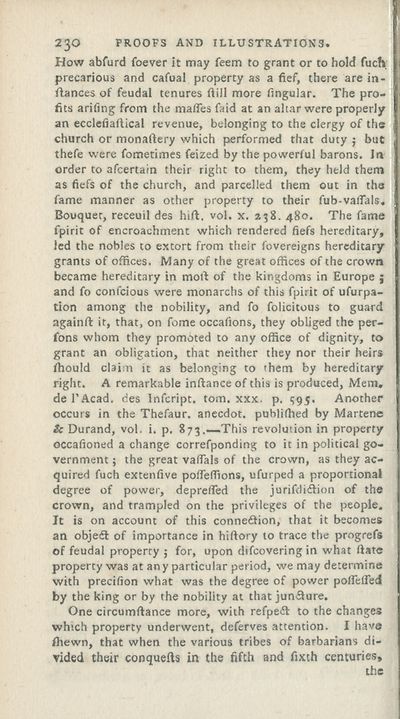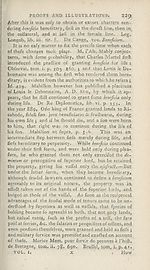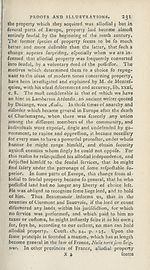Download files
Complete book:
Individual page:
Thumbnail gallery: Grid view | List view

23O PROOFS AND ILLUSTRATIONS.
How abfurd foever it may feem to grant or to hold fuch.
precarious and cafual property as a fief, there are in-
ftances of feudal tenures ftill more fingular. The pro¬
fits arifing from the malfes faid at an altar were properly
an ecclefiartical revenue, belonging to the clergy of the
church or monaftery which performed that duty ; but
thefe were fometimes feized by the powerful barons. In
order to afcertain their right to them, they held them
as fiefs of the church, and parcelled them out in the
fame manner as other property to their fub-vafials.
Bouquet, receuil des htft. vol. x. 258. 480. The fame
fpirit of encroachment which rendered fiefs hereditary,
led the nobles to extort from their fovereigns hereditary
grants of offices. Many of the great offices of the crown
became hereditary in mort of the kingdoms in Europe ;
and fo confcious were monarchs of this fpirit of ufurpa-
tion among the nobility, and fo felicitous to guard
againft it, that, on feme occafions, they obliged the per-
fons whom they promoted to any office of dignity, to
grant an obligation, that neither they nor their heirs
fhould claim it as belonging to them by hereditary
right. A remarkable inftance of this is produced, Mem.
de 1’Acad. des Infcript. tom. xxx. p. 1195. Another
occurs in the Thefaur. anecdot. publifhed by Martene
U Durand, vol. i. p. 875.—This revolution in property
occafioned a change correfponding to it in political go¬
vernment ; the great vaflals of the crown, as they ac¬
quired fuch extenfive poffeffions, ufurped a proportional
degree of power, deprefied the jurifdiftion of the
crown, and trampled on the privileges of the people.
It is on account of this connexion, that it becomes
an objeft of importance in hiftory to trace the progrefs
of feudal property ; for, upon difeovering in what (fate
property was at any particular period, we may determine
with precifion what was the degree of power poflelfed
by the king or by the nobility at that junflure.
One circumftance more, with refpeift to the changes
which property underwent, deferves attention. I have
fliewn, that when the various tribes of barbarians di¬
vided their con quells in the fifth and fixth centuries,
the
How abfurd foever it may feem to grant or to hold fuch.
precarious and cafual property as a fief, there are in-
ftances of feudal tenures ftill more fingular. The pro¬
fits arifing from the malfes faid at an altar were properly
an ecclefiartical revenue, belonging to the clergy of the
church or monaftery which performed that duty ; but
thefe were fometimes feized by the powerful barons. In
order to afcertain their right to them, they held them
as fiefs of the church, and parcelled them out in the
fame manner as other property to their fub-vafials.
Bouquet, receuil des htft. vol. x. 258. 480. The fame
fpirit of encroachment which rendered fiefs hereditary,
led the nobles to extort from their fovereigns hereditary
grants of offices. Many of the great offices of the crown
became hereditary in mort of the kingdoms in Europe ;
and fo confcious were monarchs of this fpirit of ufurpa-
tion among the nobility, and fo felicitous to guard
againft it, that, on feme occafions, they obliged the per-
fons whom they promoted to any office of dignity, to
grant an obligation, that neither they nor their heirs
fhould claim it as belonging to them by hereditary
right. A remarkable inftance of this is produced, Mem.
de 1’Acad. des Infcript. tom. xxx. p. 1195. Another
occurs in the Thefaur. anecdot. publifhed by Martene
U Durand, vol. i. p. 875.—This revolution in property
occafioned a change correfponding to it in political go¬
vernment ; the great vaflals of the crown, as they ac¬
quired fuch extenfive poffeffions, ufurped a proportional
degree of power, deprefied the jurifdiftion of the
crown, and trampled on the privileges of the people.
It is on account of this connexion, that it becomes
an objeft of importance in hiftory to trace the progrefs
of feudal property ; for, upon difeovering in what (fate
property was at any particular period, we may determine
with precifion what was the degree of power poflelfed
by the king or by the nobility at that junflure.
One circumftance more, with refpeift to the changes
which property underwent, deferves attention. I have
fliewn, that when the various tribes of barbarians di¬
vided their con quells in the fifth and fixth centuries,
the
Set display mode to:
![]() Universal Viewer |
Universal Viewer | ![]() Mirador |
Large image | Transcription
Mirador |
Large image | Transcription
| Antiquarian books of Scotland > Kings & rulers > History of the reign of the Emperor Charles V. > Volume 1 > (248) |
|---|
| Permanent URL | https://digital.nls.uk/109185307 |
|---|
| Description | By William Robertson. London : Cadell and Davies, 1798. |
|---|---|
| Shelfmark | ABS.1.76.13 |
| Additional NLS resources: | |
| Description | Thousands of printed books from the Antiquarian Books of Scotland collection which dates from 1641 to the 1980s. The collection consists of 14,800 books which were published in Scotland or have a Scottish connection, e.g. through the author, printer or owner. Subjects covered include sport, education, diseases, adventure, occupations, Jacobites, politics and religion. Among the 29 languages represented are English, Gaelic, Italian, French, Russian and Swedish. |
|---|

